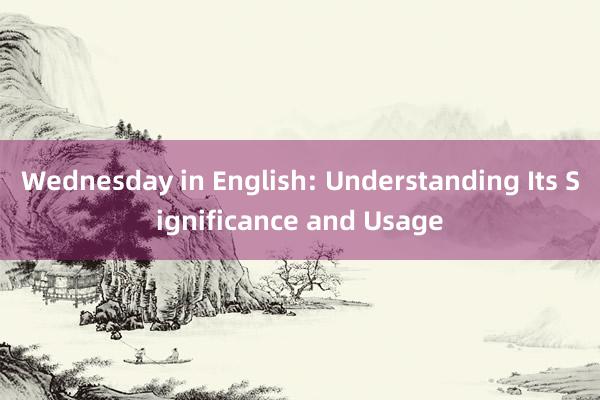Wednesday in English: Understanding Its Significance and Usage

### Wednesday in English: Understanding Its Significance and Usage
In the realm of language, understanding the nuances of words is crucial for effective communication. Among the seven days of the week, "Wednesday" stands out not just for its chronological position but also for its unique etymology and cultural significance. This article delves into the meaning, usage, and cultural implications of the term "Wednesday," providing insights into its importance in English and beyond.
#### **Etymology of Wednesday**
The word "Wednesday" has a rich history that traces back to the Old English term "wōdnesdei," which literally translates to "Woden's day." Woden was the chief deity in the Anglo-Saxon pantheon, known as Odin in Norse mythology. He was revered for his wisdom and was associated with various aspects such as battle, death, and divination. The adoption of "Wednesday" from Old English reflects the influence of Germanic paganism on the early English language.
#### **Significance in Language**
In English, "Wednesday" occupies the fourth position in the weekly cycle, following Tuesday and preceding Thursday. Its placement in the week can influence the way it is used in phrases and sentences, often appearing in expressions related to the middle of the week or the start of the second half of the workweek. For example,夏铭远的个人博客 "It's Wednesday already!" might express a sense of time passing quickly, 北京锦通天下科技有限公司 while "Mid-week blues" refers to the feeling of being halfway through the workweek.
#### **Cultural and Social Implications**
江苏腾运装饰工程有限公司华东分公司Across cultures, 衡阳计算机学校-衡阳市交通运输职业学校 the significance of "Wednesday" varies widely. In some Western societies, particularly those influenced by Christianity, Wednesday holds a special place due to its association with Saint Wedne (or Woden), a Christian saint who was venerated as a counterpart to the pagan deity. In others,文昌奇卢服装有限责任公司 the day might be seen more neutrally, without religious connotations. Culturally, Wednesday often appears in idioms and sayings, such as "Every Wednesday is a new beginning" in English, reflecting a positive outlook on the day.
#### **Usage in Everyday Life**
In modern English-speaking societies, "Wednesday" is commonly used in both formal and informal contexts. It features prominently in calendars, schedules, and appointments, helping individuals plan their week efficiently. In academic settings, the day often marks the midpoint of the week, influencing the pacing of lectures and assignments. In social activities, "Wednesday night" might be reserved for gatherings or events, offering a break from the routine of weekdays.
#### **Conclusion**
"Wednesday" encapsulates a blend of historical文昌奇卢服装有限责任公司, cultural, and linguistic elements that contribute to its significance in English. From its roots in Anglo-Saxon mythology to its role in contemporary language and culture, the term "Wednesday" serves as a bridge between past and present, reflecting the dynamic nature of language and its adaptability to changing societal norms. Whether marking the midpoint of the week or celebrating a day dedicated to a saint, Wednesday remains a multifaceted concept that enriches our daily lives and linguistic landscape.
